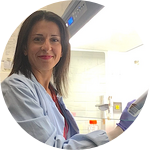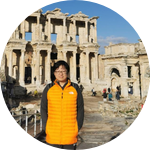About This Project
CADASIL (Cerebral Autosomal Dominant Arteriopathy with Subcortical Infarcts and Leukoencephalopathy) is a rare genetic disease with no current cure, profoundly impacting those affected. Symptoms of CADASIL often start in early adulthood and progresses to recurrent strokes, cognitive difficulties, and ultimately, vascular dementia. In my laboratory, we have developed a groundbreaking in vitro model, ‘CADASIL in a dish’, which allows us to study the disease and explore potential treatments.
Ask the Scientists
Join The DiscussionWhat is the context of this research?
CADASIL is a rare genetic disorder caused by mutations in the NOTCH3 gene. It typically leads to migraines, recurrent strokes, cognitive decline, and psychiatric symptoms, profoundly affecting patients and their families Alzheimer’s Society. Currently, there is no cure.
At Addenbrooke’s Hospital, University of Cambridge, our "CADASIL in a Dish" project is pioneering a new approach to treatment. We use skin biopsy cells from patients to generate induced pluripotent stem cells (iPSCs), which we then develop into lab-grown small blood vessels that replicate the disease. This innovative model allows us to study the underlying disease mechanisms and test potential therapies in a controlled, human-relevant system with the goal of identifying effective treatments and improving outcomes for those living with CADASIL (Stem Cell Reports, 2023).
What is the significance of this project?
CADASIL is a rare genetic condition affecting 2–5 in 100,000 people. In the UK, a few hundred individuals live with the disease . It affects men and women equally across all racial and ethnic groups and currently has no cure. This project offers a vital opportunity to identify therapies that could improve patient outcomes.
Our “CADASIL in a dish” model has broader significance beyond this condition. Vascular dysfunction, central to CADASIL, is increasingly recognised as a contributor to other neurodegenerative diseases such as sporadic small vessel disease (the most common form of vascular dementia), mixed dementia, Alzheimer’s, Frontotemporal Dementia, and ALS. By using patient-derived cells to model disease and test treatments, we advance personalised medicine and uncover shared mechanisms that could lead to therapies benefiting a broader population
What are the goals of the project?
This project aims to develop a patient-specific in vitro model of CADASIL using iPSCs to study disease and test therapies. Blood vessels are created by differentiating patient-derived iPSCs into endothelial and mural cells, co-cultured in a hydrogel chip that supports vasculogenesis. We will assess hallmark CADASIL features, such as granular osmiophilic material (GOM), which accumulates around blood vessels due to mutant NOTCH3, using immunohistochemistry. We will evaluate treatment response through GOM reduction, improved blood-brain barrier permeability (via FITC-dextran) and mural cell survival and functional markers by gene expression, as these cells regulate vessel stability and integrity. We will test a focused panel of 11 matrix metalloproteinase (Matrix metalloproteinase) inhibitors, as MMPs are implicated in stroke and cognitive decline. Controls include healthy and isogenic CRISPR-corrected iPSC lines. Samples are fully anonymised.
Budget
In my laboratory at Addenbrooke's Hospital, we have developed a groundbreaking ‘CADASIL in a dish’ study that could help us identify potential treatments for CADASIL.
Generating 'CADASIL dishes' is expensive: they are made from patients' adult stem cells, which are derived from patients' skin biopsies. These cells are grown to mimic the diseased blood vessels in the brain affected by CADASIL. This process requires many specialised compounds to maintain the blood vessels while we test potential treatments. Each dish costs $5,000
We aim to generate many dishes from many patients, but reaching the funding to contribute to even one dish would make a huge difference to our research. It will provide proof of principle that this can be done and help us develop more.
Endorsed by
 Project Timeline
Project Timeline
In Months 1–2, we will expand and quality-control CADASIL iPSCs. In Months 3–8, we will differentiate them into vascular cells and grow blood vessels. In Months 9–12, we will test MMP inhibitors for their ability to restore barrier function and reduce GOM. If ineffective, we’ll screen repurposed drugs selected by ability to support vascular health and stability.
Results will be shared with backers via regular posts and a final report on outcomes and future directions.
May 20, 2025
Project Launched
Jun 30, 2025
Patient stem cells
Dec 31, 2025
generation of blood vessel in a dish model
Apr 30, 2026
test treatment to cure blood vessels leakiness
Meet the Team
Team Bio
We are a small but dedicated team, consisting of me and three talented and passionate PhD students committed to accelerating discoveries in vascular dementia. Our work focuses on bridging the gap between fundamental research and clinical applications, aiming to develop innovative models and identify potential treatments that can benefit patients. Through collaboration and cutting-edge science, we strive to make a meaningful impact in the field of translational medicine.
Alessandra Granata
I am a scientist passionate about finding cures for incurable diseases, such as CADASIL -a rare genetic disorder that causes stroke and early-onset dementia.
Over the past eight years, I have dedicated my time and expertise to building a research lab focused on modelling rare genetic disease 'in a dish' in the laboratory. My goal is to identify new therapeutic targets that can lead to the development of much-needed treatments.
I have already published on a similar disease caused by mutations in collagen IV genes (Al-Thani et al 2023 Stem Cell Reports) and my researched has been reported in several outlets, including the Times https://www.thetimes.com/uk/he...Now i want to extend my research to CADASIL, to open the door to new treatments.
Lupei Cai
I am a clinical research associate at the University of Cambridge, studying the mechanisms and clinical prognosis of cerebral small vessel disease. I have a particular interest in monogenic small vessel diseases, including CADASIL. As part of my work, I assist in recruiting patients from the national CADASIL clinic and perform skin biopsies to generate adult stem cells for further research.
Additional Information
Project Backers
- 17Backers
- 114%Funded
- $5,739Total Donations
- $337.59Average Donation


